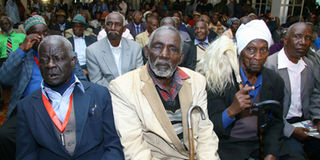How colonial DO kicked off veterans’ quest for justice

Some of the Mau Mau veterans who attended the Hilton Hotel conference where the UK government payout was announced. Photo/JENNIFER MUIRURI
What you need to know:
- In May 2009 Leigh Day’s partner Daniel Leader travelled to Nairobi to interview the potential claimants identified by the KHRC. The five lead claimants flew to London to issue their claims in person at the Royal Courts of Justice in June 2009.
In October 2002, UK-based law firm Leigh Day’s senior partner, Martyn Day, was approached in Nairobi by Mr John Nottingham, a former district officer during the emergency, together with some former Mau Mau fighters.
The publication in 2005 of two ground-breaking studies on the emergency period by two historians, Imperial Reckoning: the Untold Story of Britain’s Gulag in Kenya by Professor Elkins and Histories of the Hanged: Britain’s Dirty War in Kenya and the End of Empire by Professor Anderson, shone a spotlight on the use of torture by the British in Kenya during the colonial rule.
In the same year, Leigh Day started to work closely with the Kenya Human Rights Commission (KHRC).
The KHRC had been working with the victims of colonial era torture since 2003.
Working with the Mau Mau War Veterans Association (MMWVA), the KHRC began contacting and interviewing victims, and in July 2006 the commission interviewed a number of victims who were willing to proceed with their claims against the UK government.
On October 11, 2006 a letter of claim was served on the British government by Leigh Day. Britain responded on April 2, 2007, denying liability and refusing requests to provide claimants with any evidence it held.
In May 2009 Leigh Day’s partner Daniel Leader travelled to Nairobi to interview the potential claimants identified by the KHRC. The five lead claimants flew to London to issue their claims in person at the Royal Courts of Justice in June 2009.
In response, the British government did not deny claims that the veterans had been tortured, but instead relied on legal technicalities to avoid liability and made an application to the Court to have the case struck out and dismissed on grounds that Britain could not be liable in principle for colonial era atrocities and if anyone was liable it was the Kenyan government.
In March 2010 a letter protesting at Britain’s stance was sent to the UK government.
In January 2011, the FCO discovered thousands of secret Kenyan colonial era files held at Hanslope Park archives.
The three remaining claimants returned to the UK, in April 2011, to attend the first hearing at the High Court.
During the two-week hearing the British government argued that the claimants had claim against it and that any liabilities that had arisen had been transferred to the Kenyan republic upon independence.
In a judgment, handed down in July 2011, the High Court held that there was clearly an arguable case against the British government and that the claims were fit for trial.
Despite the claimants’ victory the British Government continued to resist their claims for redress.
The Court on October 5, 2012, ruled in favour of the claimants.




